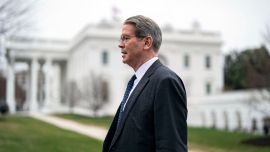An electoral year already anticipated well in advance offers no clearer horizons now that it has started (and without such lucid minds as Jorge Lanata or Beatriz Sarlo to aid our vision). President Javier Milei solidly occupying the centre of the political stage would seem to have the clearest plans but, even discounting the dependence of any strategy on black swans or events elsewhere, it is not altogether certain whether even his strident camp knows exactly what it wants out of these upcoming midterms – continuation of the political fragmentation which has served Milei very nicely so far or polarisation against a demonised ex-president Cristina Fernández de Kirchner (because their tactics seem to be moving in both directions)? Neither outcome is desirable – Congress gridlock always complicates governance while presenting Kirchnerism as the alternative might bolster majorities but will deter overseas investors indefinitely until they can see a constructive opposition as the replacement of Milei should he fail, thus making polarisation a sterile strategy. Nor will investors be reassured by seeing both the national government and Buenos Aires Province without a budget.
Quite apart from broad strategy, too much of the nuts and bolts of the midterms remain in the air. We do not know such key factors as whether the PASO primaries will be eliminated, how the new single paper ballot will pan out or whether BA Province will follow the City in holding its elections on a separate date in order to dodge Milei’s coat-tails. Regarding the latter issue, there is still no date for the separate City elections with the elimination of PASO primaries still pending while in BA Province any separation of dates from the national midterms has yet to be decided due to the adamant opposition of Cristina Kirchner, who seeks reverse coat-tails in the form of the provincial party machine and the Greater Buenos Aires mayoral “barons.” The City has less problems in defining a date but its panorama could hardly be more confused with the centre-right City Hall of Mayor Jorge Macri receiving more support from the left-leaning Radicals responding to party chairman Senator Martín Lousteau (Macri’s 2023 PASO mayoral rival) than from the rightist libertarians bent on obstructionism although the City Peronists are mooting a centrist shift under the 2023 Frente de Todos mayoral candidate, the Radical Leandro Santoro, which could merge with the Lousteau Radicals.
Against such a confused and demoralised opposition, the Milei administration is walking tall, boasting of the first financial as well as primary fiscal surplus in 16 years with inflation in full retreat. But there is no guarantee of this new year’s spring being as triumphant as the one ending a fortnight ago. Milei has taken the economy out of the red thanks to a brutal austerity which has left many sectors hurting even if a drastically reduced inflation will probably lead to poverty being below the halfway mark instead of above. But inflation was also tamed by appreciating the currency almost to the levels preceding the collapse of convertibility in 2001. Improved wages in dollar terms will fuel a consumer spending reminiscent of a Kirchnerism which always sought consumer-led rather than export-led growth (especially if interest rates remain negative for savers) but such wages will also make the productive sector less competitive while hamstringing them against the imports which a strong currency is sure to boost. Along with tourism abroad – it will be interesting to see what the balance of payments looks like at the end of this summer. Last but not least, the one-off inflow of US$32 billion from the tax whitewash is often underestimated as a key factor in a brilliant economic spring.
No wonder the government is showing a new urgency in negotiations with the International Monetary Fund (IMF) to seal a deal which includes an injection of fresh dollars. But that is not the only dependence on trends abroad – an ultra-protectionist Donald Trump is now a fortnight or so away from moving into the White House while closer to home Brazil has devalued its currency by close to 30 percent in the course of 2024, making it a prime holiday destination this summer but also posing far greater dangers as any reference to the fallout from its maxi-devaluation in early 1999 will show.
If 2024 began with 25 percent monthly inflation and hyper-recession only to be crowned with success, why should a bright start to 2025 offer any guarantees against reversals of fortune?


















Comments